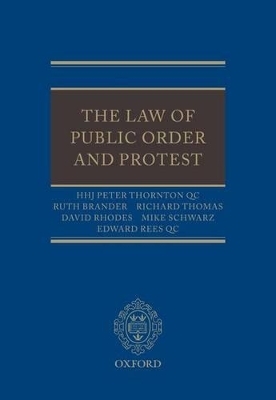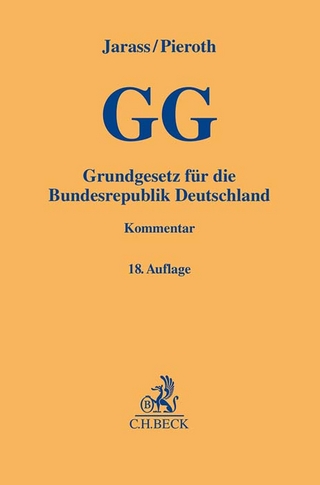
The Law of Public Order and Protest
Oxford University Press (Verlag)
978-0-19-956614-3 (ISBN)
The landscape of public order law has changed dramatically over the last decade. A wide range of legislation - including the Serious Organised Crime and Police Act 2005 and the Anti-Terrorism, Crime and Security Act 2001 has been enacted, and established legislation on trespass, criminal damage and the use of the highway, has been put to new use in the criminalisation of protestors.
The Law of Public Order and Protest provides a systematic, in-depth analysis of the law relating to public order and the right to protest. The text provides a comprehensive guide to the area, analysing the underlying legal principles and constitutional and human rights background, as well as guiding readers through all procedural matters, the use of police powers, evidential issues, defences, and available orders (including ASBOs). The narrative also analyses the case law in both the domestic and European human rights context.
The comprehensive work examines all offences brought in by statute since the Public Order Act 1986 as well as the remaining common law offences. It features offences from riot and affray, through to picketing, harassment, aggravated trespass, incitement to racial and religious hatred, and possession offences. It is up to date with the latest legislative interventions, including the new offence of glorifying terrorism, and measures introduced under the Serious Organised Crime and Police Act 2005. This new work steers you through the maze of legislation in this complex area.
HHJ Peter Thornton QC is a Senior Circuit Judge, sitting at the Central Criminal Court. He was latterly Joint Head of Chambers at Doughty Street, and was a top-ranked criminal silk. He is on the board of the Criminal Law Review and is author of (the now out of print) Public Order Law, was joint editor of The Penguin Civil Liberty Guide, and wrote Decade of Decline: Civil Liberties in the Thatcher Years. Ruth Brander (call 2001), is a barrister at Doughty Street Chambers. She practices in crime and public law, prisoners' rights, civil actions against the police and inquests. Ruth has a particular interest in the rights of vulnerable, young or mentally disordered defendants and detainees. She also specialises in representing political protesters in domestic criminal trials. She is a contributor to Human Rights in the Investigation and Prosecution of Crime (OUP forthcoming Oct 2009). Richard Thomas (call 2002), is a criminal barrister at Doughty Street Chambers. Richard practices in all areas of criminal law; as a trial and appellate advocate and in related public law proceedings. As a trial advocate, he has been instructed in cases of fraud and money laundering, attempted murder and other allegations of serious violence, the importation of Class A drugs, and rape and other sexual offences. As a lead junior he has appeared for the defence in cases of murder, substantial multi-million pound banking frauds, and drug importation cases involving international cartels. He is a contributor to Human Rights in the Investigation and Prosecution of Crime (OUP forthcoming Oct 2009). David Rhodes (call 2002), is a criminal barrister at Doughty Street Chambers. David is a specialist criminal defence advocate. He has a busy practice in the Crown Court as trial counsel alone and as a led junior across the full spectrum of offences including murder, serious violence, kidnapping, blackmail, armed robbery, drugs supply and importation, immigration offences, public disorder and offences of dishonesty. He also has experience of taking cases to the Court of Appeal. He is a contributor to Human Rights in the Investigation and Prosecution of Crime (OUP forthcoming Oct 2009). Mike Schwarz is a Partner in the Criminal Law team at Bindmans LLP. He has a leading criminal defence practice and his cases frequently include a civil liberties or public order law angle. He advises and trains national campaigning organisations on criminal and public order law, and regularly appears in the specialist and mainstream broadcast media. Edward Rees QC is a leading criminal law specialist at Doughty Street Chambers. He has appeared in numerous public order and protest cases over many years; ranging from the Bristol St Paul's riot trial, the Orgreave Miners' riot trial and the Broadwater Farm riot trial (R v Silcott) in the 1980's through to the present day and R v Ayliffe (Greenpeace 'Barry Thirteen') in 2005 and R v Olditch and Pritchard (RAF Fairford trespass) in 2007. He is an Honorary Fellow in Criminal Process at the University of Kent. He co-authors the Blackstone's Guide to the Proceeds of Crime Act 2002 (3rd edition, OUP, March 2008) and contributes annual chapters of Blackstone's Criminal Practice.
1. The Public Order Act 1986: Offences ; A. Introduction ; B. Riot: Public Order Act 1986, s 1 ; C. Violent Disorder: Public Order Act 1986, s 2 ; D. Affray: Public Order Act 1986, s 3 ; E. Fear or Provocation of Violence: Public Order Act 1986, s 4 ; F. Harassment, Alarm, or Distress: s 5 ; G. Intentional Harassment, Alarm or Distress: Public Order Act 1986, s 4A ; 2. Other Public Order Offences ; A. Overview ; B. Assault on or Obstruction of a Constable in the Execution of his Duty ; C. Prohibition of Political Uniforms ; D. Prohibition of Quasi-Military Organizations ; E: Bomb Hoaxes ; F: Racial and Religious Hatred ; G: Public Nuisance ; H: Criminal Damage ; I. Animal Research Facilities ; J. Contamination or Interfering with Goods ; K. Intimidation, including Watching and Besetting ; L. Drunk and Disorderly ; M. Football Related Disorder ; N: Taking a Photograph of a Police Officer ; 3. Processions, Assemblies, and Meetings ; A. Overview ; B. Processions ; C. Assemblies ; D. Meetings ; E. Parliament Square ; F. Other Specific Areas ; G. Other Offences Specific to Location ; H. By-Laws ; 4. Use of the Highway ; A. Introduction ; B. Definition of the Highway ; C. Use of the Highway ; D. Obstruction of the Highway ; E. Picketing ; F. Police Road Blocks ; G. By-Laws ; H. Street-based Prostitution ; 5. Trespass to Land ; A. Introduction ; B. Civil Law of Trespass to Land ; C. Criminal Law ; 6. Police Powers Before Arrest ; A. The Nature of Policing ; B. Contact with the Police Short of Arrest ; C. Establishing Identity ; D. Control of Movement ; E. Stop and Search: Before Arrest ; F. Breach of the Peace ; G. The Use of Force by the Police ; H. Conclusion ; 7. Arrest, Detention, and Bail ; A. Arrest ; B. Detention at the Police Station ; C. Bail Conditions and Remands in Custody After Charge ; 8. Defences of Excuse and Justification ; A. Introduction ; B. General Principles ; C. The Prevention of Crime ; D. The Protection of Property ; E. Necessity/Duress of Circumstances ; F. Acting in the Public Interest ; 9. Punishment, Appeals, and Restrictive Orders ; A. Sentencing Principles in Protest Cases ; B. Binding Over ; C. Alternatives to Conviction ; D. Appeals ; E. Injunctions ; F. Anti-Social Behaviour Orders (ASBOs) ; G. Football Banning Orders ; 10. Human Rights ; A. Introduction ; B. Articles 10 and 11 ; C. Article 9: Freedom of Thought, Conscience, and Religion ; D. Article 8: Right to Respect for Private and Family Life ; E: Article 5: Right to Liberty and Security ; F: Article 6: Right to a Fair Trial ; G: Article 2: Right to Life ; H: Article 3: Prohibition of Torture ; Index
| Erscheint lt. Verlag | 25.3.2010 |
|---|---|
| Verlagsort | Oxford |
| Sprache | englisch |
| Maße | 176 x 252 mm |
| Gewicht | 1037 g |
| Themenwelt | Recht / Steuern ► EU / Internationales Recht |
| Recht / Steuern ► Öffentliches Recht ► Verfassungsrecht | |
| Recht / Steuern ► Strafrecht ► Besonderes Strafrecht | |
| ISBN-10 | 0-19-956614-3 / 0199566143 |
| ISBN-13 | 978-0-19-956614-3 / 9780199566143 |
| Zustand | Neuware |
| Haben Sie eine Frage zum Produkt? |
aus dem Bereich


